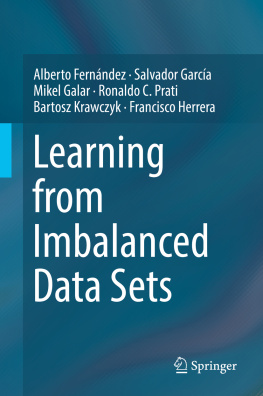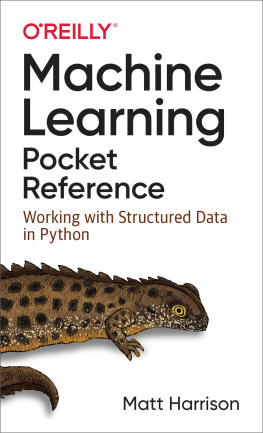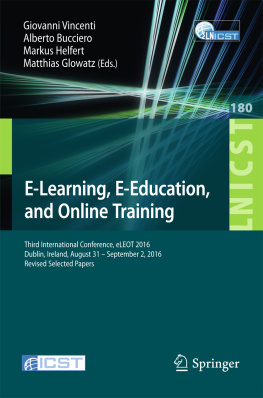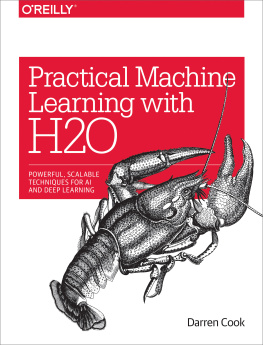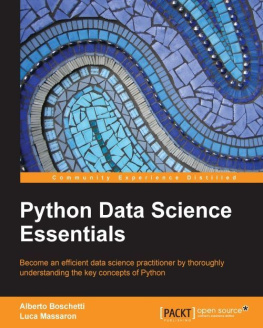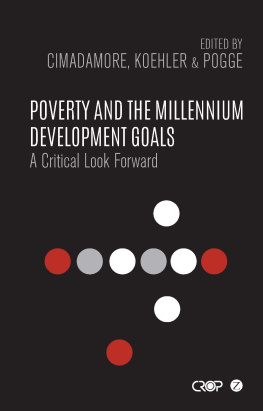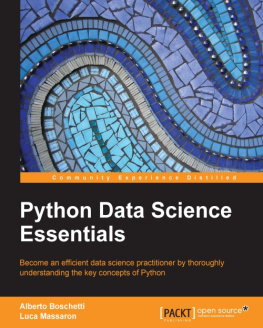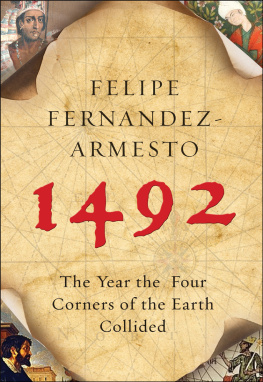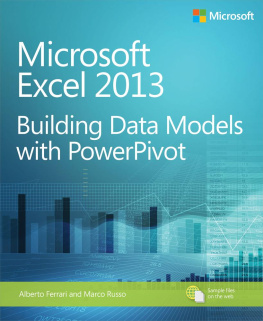Alberto Fernández - Learning from Imbalanced Data Sets
Here you can read online Alberto Fernández - Learning from Imbalanced Data Sets full text of the book (entire story) in english for free. Download pdf and epub, get meaning, cover and reviews about this ebook. publisher: Springer International Publishing, genre: Computer. Description of the work, (preface) as well as reviews are available. Best literature library LitArk.com created for fans of good reading and offers a wide selection of genres:
Romance novel
Science fiction
Adventure
Detective
Science
History
Home and family
Prose
Art
Politics
Computer
Non-fiction
Religion
Business
Children
Humor
Choose a favorite category and find really read worthwhile books. Enjoy immersion in the world of imagination, feel the emotions of the characters or learn something new for yourself, make an fascinating discovery.
- Book:Learning from Imbalanced Data Sets
- Author:
- Publisher:Springer International Publishing
- Genre:
- Rating:3 / 5
- Favourites:Add to favourites
- Your mark:
- 60
- 1
- 2
- 3
- 4
- 5
Learning from Imbalanced Data Sets: summary, description and annotation
We offer to read an annotation, description, summary or preface (depends on what the author of the book "Learning from Imbalanced Data Sets" wrote himself). If you haven't found the necessary information about the book — write in the comments, we will try to find it.
Learning from Imbalanced Data Sets — read online for free the complete book (whole text) full work
Below is the text of the book, divided by pages. System saving the place of the last page read, allows you to conveniently read the book "Learning from Imbalanced Data Sets" online for free, without having to search again every time where you left off. Put a bookmark, and you can go to the page where you finished reading at any time.
Font size:
Interval:
Bookmark:
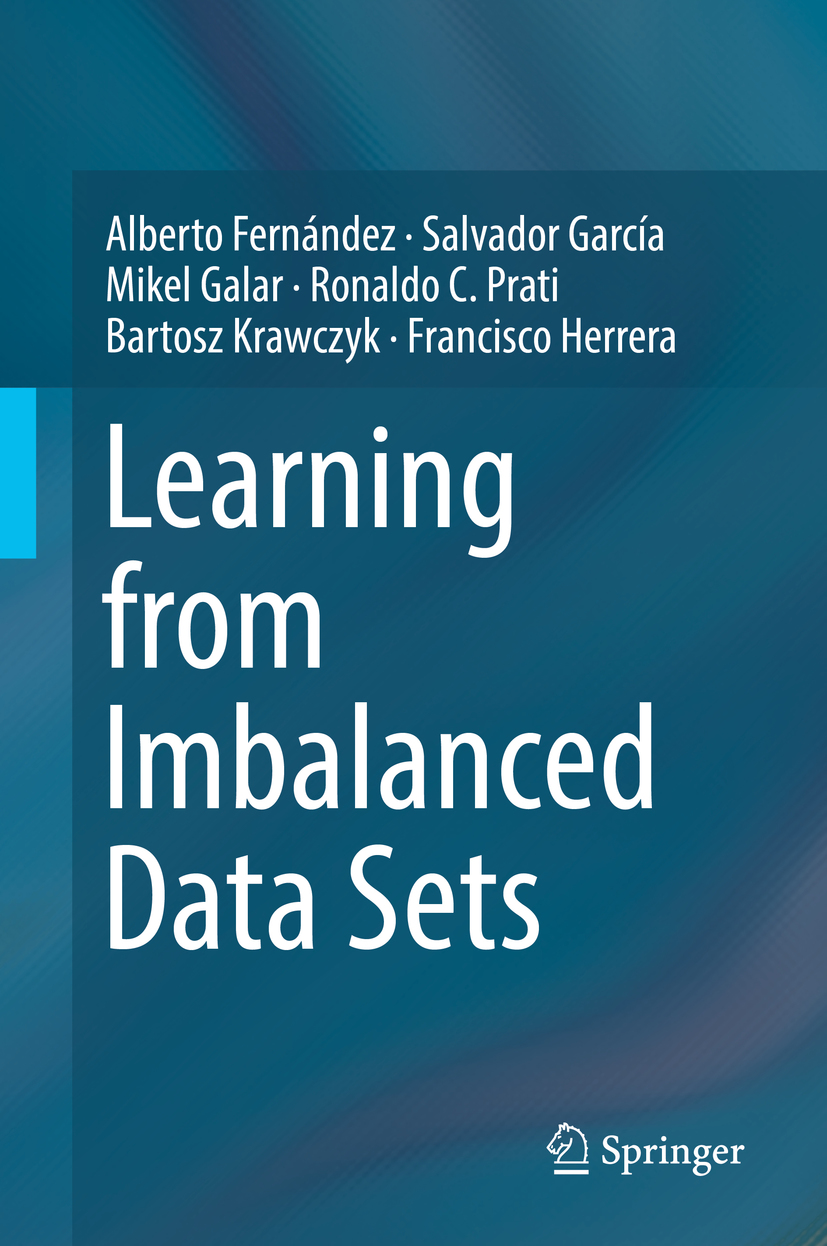

This Springer imprint is published by the registered company Springer Nature Switzerland AG
The registered company address is: Gewerbestrasse 11, 6330 Cham, Switzerland
To my beloved wife, my family, friends, and close colleagues. For their support since the very beginning.
Alberto Fernndez
To my family
Salvador Garca
To my family
Mikel Galar
To my family
Ronalo C. Prati
To my family
Bartosz Krawczyk
To my family
Francisco Herrera
Learning with imbalanced data refers to the scenario in which the amounts of instances that represent the concepts in a given problem follow a different distribution. The main issue when addressing such a learning problem is when the accuracy achieved for each class is also different. This situation occurs since the learning process of most classification algorithm is often biased toward the majority class examples, so that minority ones are not well modeled into the final system. Being a very common scenario in real-life applications, the interest of researchers and practitioners on the topic has grown significantly during these years.
Based on the experience of the authors after several years focused on imbalanced classification, this book aims at offering a general and comprehensible overview for anyone interested in this area of study. It contains a formal description of the problem and focuses on its main features and the most relevant proposed solutions. Additionally, it considers the different scenarios in Data Science for which the imbalanced classification can suppose a real challenge.
After a gentle introduction to the KDD process and current state of Data Science in the first chapter, the book then stresses the gap with standard classification tasks by establishing the foundations and reviewing the case studies with a direct application in this area in Chap. on the extension of the problem for multi-class problems, where the former classical methods are no longer to be applied in a straightforward way.
The book includes in Chap..
This thorough review on the current and future state of imbalanced classification aims giving this topic the significance it deserves. In particular, the interest of research and academia is clearly shown by the rising number of publications and citations year by year. In the foreseeable future, it predictably will continue expanding with novel significant developments, as many contemporary real-world applications must be addressed from the viewpoint of imbalanced classification.
The intended audience of this book are developers and engineers aiming to apply imbalance-learning techniques to solve different kinds of real-world problems, as well as researchers and students needing a comprehensive review on techniques, methodologies, and tools for learning from imbalanced data.
We wish to thank all our collaborators of the research group Soft Computing and Intelligent Information Systems. We are also thankful to our families for their helpful support.
Adaptive synthetic sampling
ALActive learning
ANNArtificial neural network
AUCArea under the curve
AUCROCArea under the ROC curve
AUCPRArea under the precision-recall curve
CVCross-validation
CNNCondensed nearest rule
DMData mining
DRDimensionality reduction
ECError concentration
EMExpectation-maximization
FCVFold cross-validation
FSFeature selection
ISInstance selection
KDDKnowledge discovery in data
KEELKnowledge extraction based on evolutionary learning
KNNK-Nearest neighbors
LLELocally linear embedding
LVQLearning vector quantization
MCCMatthews correlation coefficient
MDSMultidimensional scaling
MIMutual information
MILMulti-instance learning
MLMachine learning
MLLMultilabel learning
MLPMultilayer perceptron
MVMissing value
NCLNeighborhood cleaning rule
NNNearest neighbor
OSSOne-sided selection
PCAPrincipal components analysis
PU-learningPositive and unlabeled learning
RBFNRadial basis function network
ROCReceiver operating characteristic curve
SMOTESynthetic minority over-sampling technique
SONNSelf-organizing neural network
SSLSemi-supervised learning
SVMSupport vector machine
Font size:
Interval:
Bookmark:
Similar books «Learning from Imbalanced Data Sets»
Look at similar books to Learning from Imbalanced Data Sets. We have selected literature similar in name and meaning in the hope of providing readers with more options to find new, interesting, not yet read works.
Discussion, reviews of the book Learning from Imbalanced Data Sets and just readers' own opinions. Leave your comments, write what you think about the work, its meaning or the main characters. Specify what exactly you liked and what you didn't like, and why you think so.

